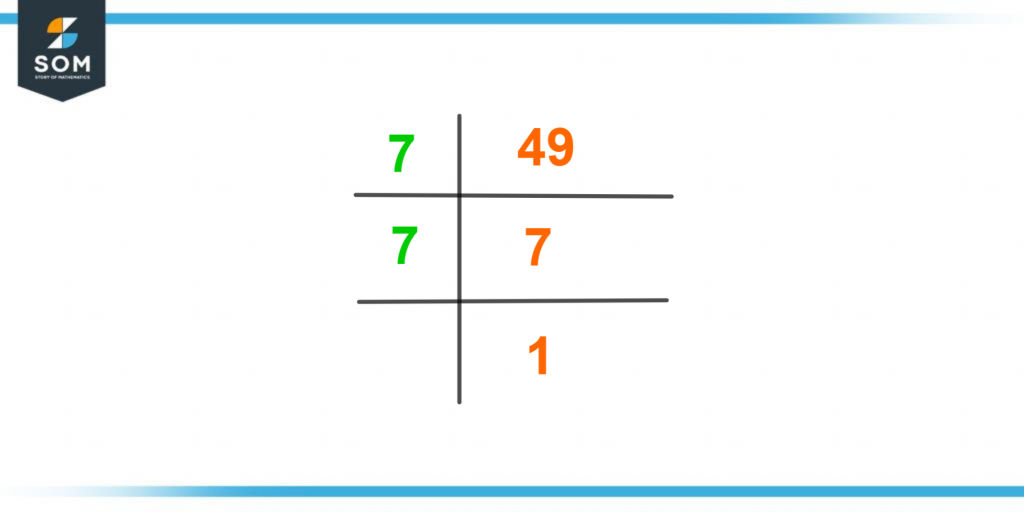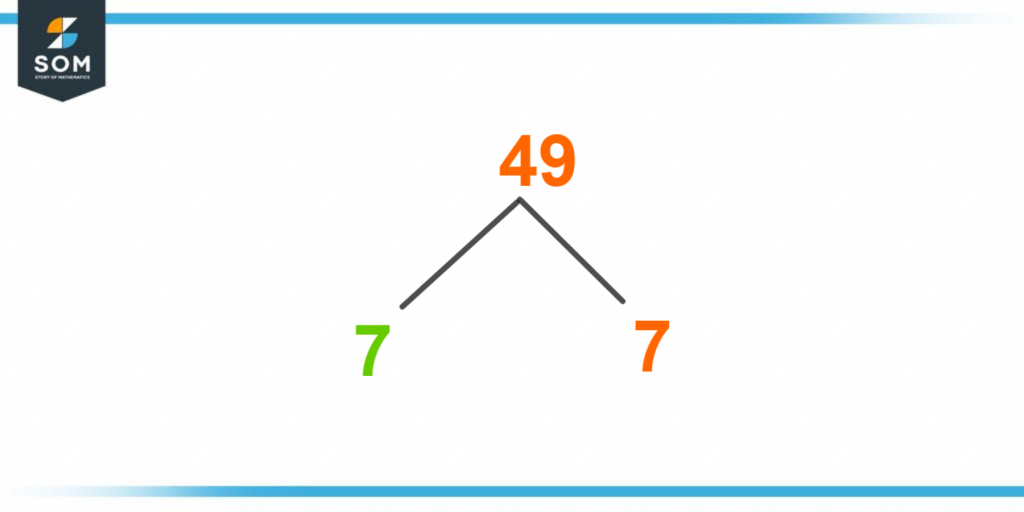JUMP TO TOPIC
Factors of 49: Prime Factorization, Methods, Tree, and Examples
The factors of 49 are the numbers that result in 49 when multiplied together in pairs. In other words, the factors of 49 can be described as follows:
Figure 1 – All possible Factors of 49
What Are the Factors of 49?
The factors of 49 are 1, 7, and 49.49 is an odd composite number that has only 3 factors in total. All the above numbers are perfect divisors of 49. When 49 is divided by these three numbers, it is entirely divided with no remainder.Points To Ponder
- Number 1 is the smallest factor of every number. So, 1 is a factor of 49.
- The number itself is the largest factor of that number. Hence, 49 is a factor of 49.
- Number 49 is a deficient number or defective number. A deficient number is a number n for which the sum of divisors of n is less than 2n.
How To Calculate the Factors of 49?
There are different methods to calculate the factors of 49, such as division method. To find the factors of 49, start dividing 49 by the smallest natural number that divides 49 completely and proceed with consecutive natural numbers up to the number 49.Divide 49 by the smallest natural number i.e., 1.\[\dfrac{49}{1} = 49 , r = 0 \]As it has completely divided 49 and the remainder is zero (i.e., r=0), so 1 is a factor of 49.Now, divide 49 by the smallest even prime number i.e., 2.\[\dfrac{49}{2} = 24.5 , r ≠ 0 \]As it has not again divided 49 completely because the quotient is in fraction. Hence, the remainder is not zero. Therefore 2, is not a factor of 49.The number 49 cannot be divided completely by 3 as the cross sum of 49 is 13 which is not divisible by 3. Hence, 3 is also not a factor as well as a divisor of 49.The next number which is the divisor of 49 is 7.\[\dfrac{49}{7} = 7, r = 0 \]As 7 has divided 49 exactly. So, 7 is too a factor of 49.After the number 7, there is no natural number that divides 49 completely up to 48. So, after the number 7, 49 itself is only a factor of itself. This can be expressed as below:\[\dfrac{49}{49} = 1, r = 0 \]Hence, all the above three numbers (i.e., 1, 7, and 49) exactly divide 49 without leaving any remainder. So, all the above numbers are factors of 49. If we divide 49 by any numbers other than 1, 7, and 49, it leaves a remainder, and hence, they are not the factors of 49.The method described above is called the division method to find factors of a number.Basic Information About Factors
- All divisors of a number are also factors of that number irrespective of prime or composite numbers. In this case, 49 has only 3 divisors.
- Factors of 49 can never be in fractions or decimals.
- Factors of 49 can be positive as well as negative.
Factors of 49 by Prime Factorization
When the number 49 is demonstrated as a product of all its possible prime factors, it is called as the prime factorization of the number 49. This method is most commonly used to calculate the factors of a given number.To find factors of 49 by the prime factorization method, divide 49 by the smallest prime number which divides 49 exactly without any remainder. Then the quotient is again divided by the smallest prime number and the procedure continues until we get the quotient as 1.Following is the method to calculate factors of 49 by prime factorization.First, divide 49 by the smallest possible prime number divisor which is 7.\[\dfrac{49}{7} = 7 \]The quotient 7 is a prime number and can further be divided by 7 only.\[\dfrac{7}{7} = 1 \]The quotient 1 cannot be further divided. Therefore, the prime factorization of 49 can be stated as:Prime Factorization of 49 = 7 × 7
The prime factorization of 49 can also be written as:\[49 = 7^2 \]The prime factorization of 49 is shown in following figure 1:
Figure 2 – Prime Factorization of 49
Important Definitions
- If any number has only two divisors that is 1 and the number itself, it is called a prime number.
- If the factors of a number are prime numbers, then the factors are called prime factors.
- Prime factorization is a method to write a number as a product of all of its prime factors.
Factor Tree of 49
A factor tree is another way for easy calculation of the factors of a number, specifically the prime factorization of a number in which each branch in the tree splits into factors.Once the factor at the end of the branch is a prime number, and the other is a composite number. Divide the composite number again unless the only two factors remain, that are prime numbers, and the branch stops.Considering the rules of division by factor tree method, If we write 49 into its multiples, it would be:49 = 7 x 7
It is very important to note here that the number 49 has produced prime numbers on both of the branches in a single split. Thus, it cannot go on any further and its factor tree appears as following figure 2.
Figure 3 – Factor Tree of 49
Factors of 49 in Pairs
Factors of 49 in pairs are the sets of two integral numbers, whose product gives us the number 49 are called factors of 49 in pairs. In other words, it is the product of the factors of the number 49 represented in the form of pairs.Pair Factors are a pair of numbers that are multiplied by each other and give the result of 49. Following are the pair factors of 49.1 x 49 = 49
7 x 7 = 49
49 x 1 = 49
As there are only 3 factors of 49. So, these factors can be written in pairs as follows:(1, 49)
(7, 7)
(49, 1)
49 also can have two negative numbers as pair factors. For example:(-1) x (-49) = 49
(-7) x (-7) = 49
(-49) x (-1) = 49
Hence, the following are some examples of negative pair factors of 49:(-1, -49)
(-7, -7)
(-49, -1)
So, it can be derived that the product of all factors of 49 in its negative form, gives the result 49. Hence, all are called negative pair factors of 49.Important Facts About 49
- 49 is a composite number.
- 49 is also an odd number.
- 49 has only one prime factor.
- All the factors of 49 are odd numbers.
- 49 has 3 divisors.
- 49 has 3 positive pair factors and 3 negative pair factors.
- The number 7 is the only prime factor of 49.
- The number 49 is a perfect square.
- The number 49 is a semi-prime number
Factors of 49 Solved Examples
Example 1
Express 49 in the form of its prime factorization.Solution
As we know that;Prime factorization of 49 = 7 × 7
So, 49 can be expressed in the form of its prime factorization as follows:\[49 = 7^2 \]Example 2
Which of the following statement is True about factors of 49?- The smallest even number is a factor of 49.
- The smallest odd number is a factor of 49.
- 49 has only one prime factor
- 49 is not a perfect square.
Solution
The factors of 49 are 1, 7, and 49.Statement 1 is false as the smallest even number (i.e., 2) is not a factor of 49.Statement 2 is also false as the smallest odd number (i.e., 3) is not a factor of 49.Statement 3 is true as from all the above-mentioned factors only 7 is a prime number.Statement 4 is false as 49 is a perfect square of 7.Example 3
John has been assigned a task to find the Average of all factors of 49. What is the solution to this problem?Solution
John knows that the factors of 49 are 1, 7, and 49.Sum of all factors of 49 = 1 + 7 + 49 = 57
Number of factors of 49 = 3
Average of factors for 49 = Sum of all factors of 49 ÷ Number of factors of 49
Average of factors for 49 = 57 ÷ 3
Average of factors for 49 = 19
Hence, the average of all factors of 49 is 19.Images/mathematical drawings are created with GeoGebra.